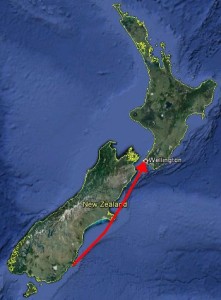









 Imagine for a moment that you are a student at Dortmund University in Germany (highlighted on the map to the left). You chose to go there, let’s assume, because of the climate – both academic and geographical. Then imagine one day you woke up in Austria. You’ve moved! You’ve gone from one place to another. You’re no longer in the same place, and your climate – one would assume – has changed. In fact, you hear on the radio as you eat breakfast that literally millions and millions of people who were in Germany are now in Austria. The population of Germany is waning, and people are flooding into Austria.
Imagine for a moment that you are a student at Dortmund University in Germany (highlighted on the map to the left). You chose to go there, let’s assume, because of the climate – both academic and geographical. Then imagine one day you woke up in Austria. You’ve moved! You’ve gone from one place to another. You’re no longer in the same place, and your climate – one would assume – has changed. In fact, you hear on the radio as you eat breakfast that literally millions and millions of people who were in Germany are now in Austria. The population of Germany is waning, and people are flooding into Austria.
Well, actually, not exactly. That’s the impression you might have initially: You were in the West of Germany, and now you’re in  Austria, so you must have moved. There must be a mass Exodus going on if millions of people from Germany are suddenly in Austria. But actually, in the place where you are now, the sky is the same as it was before, the climate is the same, the people are the same, and in fact – your location is the same! How is this possible? Here’s how: While you were sleeping, an invasion took place. A swift but decisive battle was fought, and invaders from Austria re-drew the border dividing Germany from Austria, as illustrated on the right. People who regarded themselves as German before still regard themselves as Germans now, but the Austrians – they will take some convincing!
Austria, so you must have moved. There must be a mass Exodus going on if millions of people from Germany are suddenly in Austria. But actually, in the place where you are now, the sky is the same as it was before, the climate is the same, the people are the same, and in fact – your location is the same! How is this possible? Here’s how: While you were sleeping, an invasion took place. A swift but decisive battle was fought, and invaders from Austria re-drew the border dividing Germany from Austria, as illustrated on the right. People who regarded themselves as German before still regard themselves as Germans now, but the Austrians – they will take some convincing!
The Invading Austrians are happy for you to continue life as before, which you happily do. OK, so you’ve come to accept that although you’re in exactly the same place you were in before, the militant Austrians now call the land you stand on “Austria.” But then imagine that the Austrians start sending out press releases: There has been a mass exodus from Germany to Austria! The population of Austria is on the rapid rise! Austria must be really popular, because people are leaving Germany and moving to Austria. You can’t believe your eyes as you read the headlines in one after the other daily Germ- I mean Austrian newspaper. This is nonsense! That’s not what happened at all. Nobody changed where they live – The Austrians have just changed the labels on the map! There’s no “move” from Germany to Austria going on.
OK, as you can probably gather, I’m painting this scene as an analogy, and the scene is now set. I’m really talking about philosophy of mind and two points of view therein: Dualism and Physicalism. Physicalism is Germany. Dualism is Austria. Dualists are changing the map.
Read More


 I’m excited to let you know that on Friday the 29th of June (local time) I will be speaking to the Los Angeles chapter of Reasonable Faith.
I’m excited to let you know that on Friday the 29th of June (local time) I will be speaking to the Los Angeles chapter of Reasonable Faith.

 I’m heading for the seat of power! In a manner of speaking, anyway. In a couple of weeks I’m getting on a plane, becoming a North Island dweller once more and moving up to Wellington, the capital of New Zealand. I’m going to be working on a project for my employer (I won’t bore you with the details of that here).
I’m heading for the seat of power! In a manner of speaking, anyway. In a couple of weeks I’m getting on a plane, becoming a North Island dweller once more and moving up to Wellington, the capital of New Zealand. I’m going to be working on a project for my employer (I won’t bore you with the details of that here).

 Imagine for a moment that you are a student at Dortmund University in Germany (highlighted on the map to the left). You chose to go there, let’s assume, because of the climate – both academic and geographical. Then imagine one day you woke up in Austria. You’ve moved! You’ve gone from one place to another. You’re no longer in the same place, and your climate – one would assume – has changed. In fact, you hear on the radio as you eat breakfast that literally millions and millions of people who were in Germany are now in Austria. The population of Germany is waning, and people are flooding into Austria.
Imagine for a moment that you are a student at Dortmund University in Germany (highlighted on the map to the left). You chose to go there, let’s assume, because of the climate – both academic and geographical. Then imagine one day you woke up in Austria. You’ve moved! You’ve gone from one place to another. You’re no longer in the same place, and your climate – one would assume – has changed. In fact, you hear on the radio as you eat breakfast that literally millions and millions of people who were in Germany are now in Austria. The population of Germany is waning, and people are flooding into Austria. Austria, so you must have moved. There must be a mass Exodus going on if millions of people from Germany are suddenly in Austria. But actually, in the place where you are now, the sky is the same as it was before, the climate is the same, the people are the same, and in fact – your location is the same! How is this possible? Here’s how: While you were sleeping, an invasion took place. A swift but decisive battle was fought, and invaders from Austria re-drew the border dividing Germany from Austria, as illustrated on the right. People who regarded themselves as German before still regard themselves as Germans now, but the Austrians – they will take some convincing!
Austria, so you must have moved. There must be a mass Exodus going on if millions of people from Germany are suddenly in Austria. But actually, in the place where you are now, the sky is the same as it was before, the climate is the same, the people are the same, and in fact – your location is the same! How is this possible? Here’s how: While you were sleeping, an invasion took place. A swift but decisive battle was fought, and invaders from Austria re-drew the border dividing Germany from Austria, as illustrated on the right. People who regarded themselves as German before still regard themselves as Germans now, but the Austrians – they will take some convincing! In the Nuts and Bolts series I lay out some of the basic concepts thrown around in my areas of interest – philosophy, theology and biblical studies – and explain them for those unfamiliar with them.
In the Nuts and Bolts series I lay out some of the basic concepts thrown around in my areas of interest – philosophy, theology and biblical studies – and explain them for those unfamiliar with them.